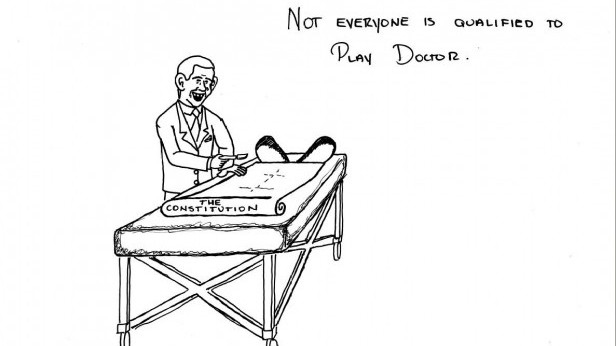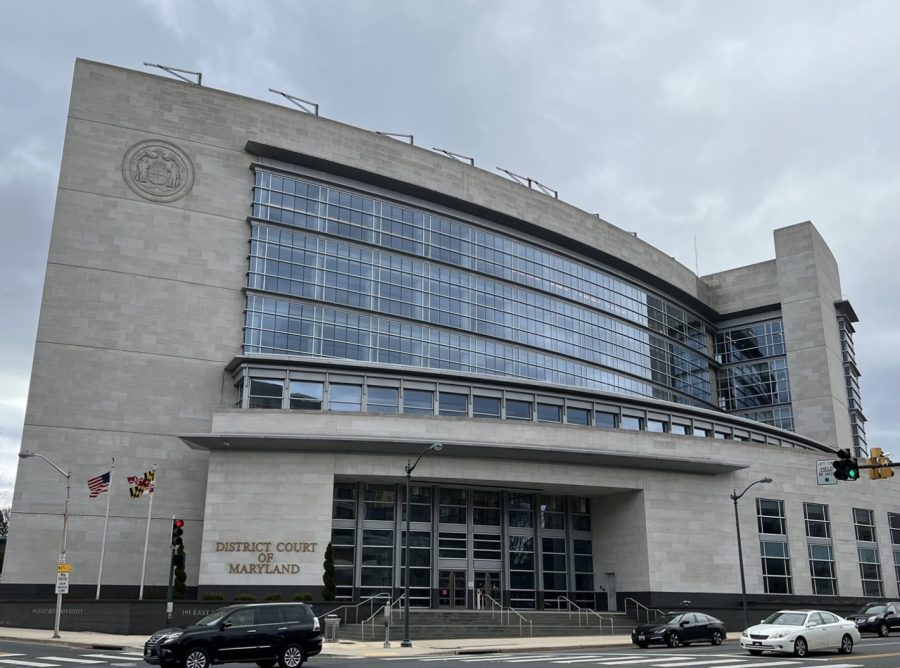As students wrap up the year with exams and graduation this June, the Supreme Court will release its decision on a case that will have more effect on their lives than they may realize.

The upcoming vote on the Patient Protection and Affordable Care Act — often referred to as Obamacare — is a huge opportunity for the Supreme Court to eliminate a law that dangerously expands the powers of the federal government, one they can’t afford to miss.
At the heart of the issue is the individual mandate, the clause that requires all citizens to buy health insurance or pay a penalty to the government. This requirement is unconstitutional, because the clause grants the federal government the authority to force citizens into the health insurance market without leaning on any constitutionally enumerated or implied power.
The Obama administration argued before the Supreme Court that because all citizens will, at one time or another, enter the health care market, the individual mandate falls under the commerce clause. But this argument is flawed, because the government isn’t regulating commerce. Rather, it’s forcing citizens into a market they may otherwise choose not to participate in.
Special Prosecutor Donald Verilli argued that the healthcare market is unique, because all citizens, regardless of whether they have insurance, enter the market at birth. But saying that everyone enters a market simply by being born dangerously expands the power of the commerce clause by leaving citizens no option to refrain from commerce.
Students shouldn’t just hope the Supreme Court strikes the law down to check the government: they could also feel negative economic effects as a result of the law. The Congressional Budgeting Office projects a 10-year cost of about $1.7 trillion, a figure that many critics allege is still too low. And while proponents of the law argue that the government spends more paying for citizens without health insurance, their estimates are largely speculative and unsupported The costs of another long-term entitlement responsibilities, on the other hand, are an unfortunate reality. Along with the rest of the country, students will directly suffer from this law because they will be taxed to pay off the government’s irresponsible entitlement spending.
The law levies $503 billion in additional taxes on employers and health care providers through the end of this decade. Among these taxes is a $2,000 per employee fine for any employer who doesn’t provide health insurance and has over 50 workers. Sussex University’s Beacon Hill Institute study of Massachusetts’ health care system, which has a similar individual mandate requirement, found that the state lost 18,313 jobs in 2010 as a result of its health care bill. Extend that to a national level, and the proportion of unemployed or underemployed recent college graduates, already at 53 percent according to the Associated Press, is likely to grow.
As students wrap up the year, they should recognize that just a few miles away the Supreme Court will be determining whether or not to add yet another burden on the backs of taxpayers. Will the Supreme Court make the right choice? We’re headed for trouble if it doesn’t.













average • Oct 31, 2012 at 12:01 pm
your really going to refute CBO numbers. with what. paying for people without insurance in emergency room is what makes the goverment pay the most for the least amount of care of any industrialized nation
Jacob Cutler • May 29, 2012 at 5:00 pm
Thank you all for your comments.
Fact Checker: You cite a study by the CBO asserting that the ACA will reduce the deficit by 1.2 trillion over twenty years. This is interesting, because having spoken with CBO director Doug Elmendorf, I know that the CBO doesn’t know what will happen in the next twenty years, or past 2022, and never said put any kind of number on deficit reduction past 2022. In addition, the $130 billion in savings from 2012-2022 are misleading because the government does not begin spending on the bill until 2014, but has been collecting revenue since 2010. Therefore, that projection reflects 8 years of spending(2014-2022), over 10 years of revenue(2012-2022). Given that the original CBO spending estimate have doubled from $930 billion to $1.76 trillion after releasing projections that go until 2022, (previous projections only went until 2019, and thus included only 6 years of spending) my assertion that the law adds to our already heavy burden from irresponsible spending is justified. And the above estimates are with the Obama administration’s counting tricks like double counting, which forced the CBO to count certain Medicare savings twice, without which, a Republican House Committee has found, cost projections would be much higher.
Many commenters have also mentioned premiums. But many economists, including noted MIT economist John Gruber, have redacted their former claims that the law reduces premiums. Gruber in particular has noted to government authorities in several states that premiums could in fact rise dramatically as a result of the bill.
fact checker • May 28, 2012 at 3:15 pm
How convenient it is to distort facts in pursuit of an argument. When the healthcare law was passed, the Congressional BUDGET Office estimated that the Patient Protection and Affordable Care Act would reduce the federal deficit by $210 billion over the 2012-2021 period. Over 20 years, according to the CBO, it will cut the deficit by over one trillion dollars. The author of this article throws out facts to confuse, not to clarify. Also, he uses biased sources as if they were impartial analysts. For example, the Beacon Hill Institute is a conservative think tank funded by right-wing foundations, and often its reports are written to justify conservative viewpoints. Finally, the author needs to better understand how commerce works. Let’s say our author goes to the emergency room with a broken collarbone but does not have insurance. Someone eventually pays for that because the hospital does not do it for free. Eventually, it shows up in higher premiums for those of us who do have insurance, thus taking money away from some and delivering it to those who do have insurance. It is a concept called cost-shifting, and that is the fundamental argument behind the healthcare law. Whether the Supreme Court upholds it or not may be less a matter of the facts and more matter of the 5 to 4 conservative majority on the nation’s highest bench. Like the Beacon Hill Institute, the conservative majority may be looking for evidence to justify its conclusions.
Calvin Schalch • May 24, 2012 at 8:16 am
Conservatives are just wrong, no matter how smart or reasonable the arguments they make, they’re just fundumentally wrong, and the values they express are not american at all. The government cares for the people, insurance companies do not. I think you people that support repeal should look at yourselves and rethink how you think.
Senior(itis) • May 23, 2012 at 8:26 pm
Really enjoyed the article Jacob! I haven’t really paid much attention to this since sophomore year NSL, but based on the current state of Europe’s economic affairs we may want to abstain from moving in their direction, which includes government funded health care.
AB • May 22, 2012 at 1:42 pm
I respect u for writing this article jacob
Chris Hodgman • May 22, 2012 at 10:15 am
What people don’t realize is that the entire “government has too much power” argument is flawed. First off, if you compare the US to other democratic nations, we (generally) have a much less active government as it is. Second, what’s going to happen if the government gains this power? An instant overthrow of democracy and the descent of the US into a dictatorship? I don’t think so. Claiming that the government (which, by the way, is an institution designed to actually provide for the people, unlike an insurance company, which is designed to make money) should be limited and restrained on every front is counterproductive and will create more problems than it will solutions.
Tupac (!) • May 21, 2012 at 8:24 pm
While you are correct that the commerce clause doesn’t really apply to Obamacare, you would be arguing against the entire history of U.S judicial precedent if you think that the C.C should never be stretched. Almost since the establishment of judicial review, the commerce clause has been stretched and twisted to cover thousands of issues, most of which have nothing to do with commerce. There are other reasons to repeal it. Its use of the CC is certainly not one of them.
And since when have individual mandates been a problem? The United States has always forced each of its taxpaying citizens to buy roads, schools, pay for postal service, etc. Individual mandates aren’t new.
average student • May 21, 2012 at 11:53 am
Idk the goverment already require us to buy car insurance, home insurance, in WWII war-time bonds, in the 1970s only certain types of gas, retirment funds ect. its not unpecendented for the goverment to make us buy something.
CM Punk • May 20, 2012 at 6:23 pm
@Spider-Man Maybe, they’ll make us buy Mac & Cheese insurance from those Kraft commercials…which I wouldn’t have a problem with.
Spider-Man • May 20, 2012 at 11:10 am
It is ridiculous that the federal government thinks it can force its citizens to buy things. Imagine the long term implications of this bill. What will the government require us to buy next?
I need Health Care • May 20, 2012 at 10:35 am
You forget that if people go to the emergency room without health care, then people WITH health care have to pay for them with raised premiums. So obviously, they have the authority to regulate this, as it affects the nationwide economy. In US v Lopez, the court laid out three categories of activity that Congress can regulate:
“the channels of interstate commerce,
the instrumentalities of interstate commerce, or persons or things in interstate commerce, and
activities that substantially affect or substantially relate to interstate commerce”
Because health care substantially affects interstate commerce, Congress’ new law is simply shifting when and how people are paying for health care by requiring everyone to pair their fair share of the costs.
Joe Lilek • May 19, 2012 at 8:33 pm
I’m no lawyer, but here’s the first part of Sec. 8 of the first Article of the US Constitution:
“The Congress shall have Power To lay and collect Taxes, Duties, Imposts and Excises, to pay the Debts and provide for the common Defence and general Welfare of the United States;”
When both the healthcare bills and penalties are viewed as taxes, they are unequivocally providing for the general welfare of the nation.
A side note: Obamacare is not the typical name for the Patient Affordable Care Act. It is a partisan, Republican attack on President Obama and the Democratic Party (not the Democrat Party). Regardless, this was a well-written piece, Jacob.
CM Punk • May 19, 2012 at 4:19 pm
I just want to know the links to the studies and surveys that are talked about in this article.
Anthony Kennedy • May 19, 2012 at 11:04 am
This is a fine article, but if you’re going to comment on the constitutionality of the law, it’s unfair to comment on the economic effects of the law. The Supreme Court will only review the constitutionality of the law, and not the helpful or harmful effects of the law.
------------ • May 18, 2012 at 5:33 pm
Choosing not to participate in the health care market directly affects those who are in it. When one goes into an emergency hospital, that hospital is by law required to give you service. More times than not, the people who have have gotten treatment in these hospitals, cannot, or will not pay their bills, increasing insurance premiums for those who are covered.